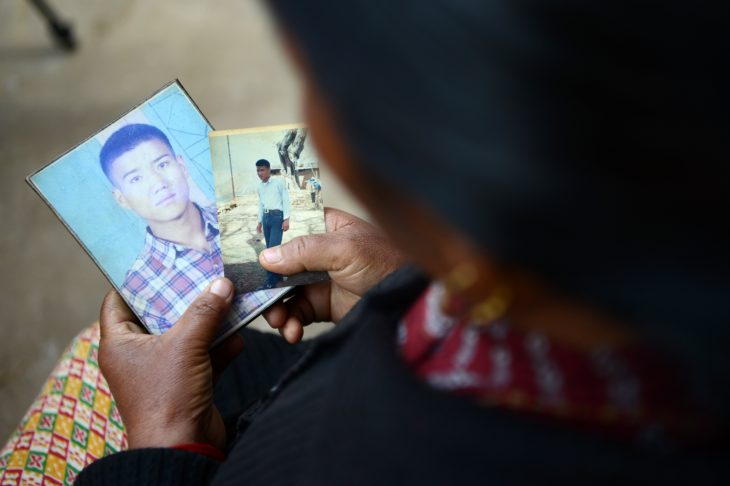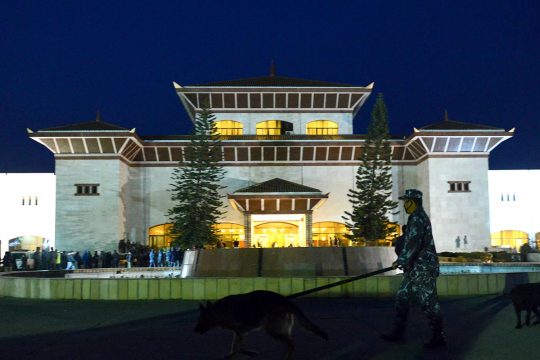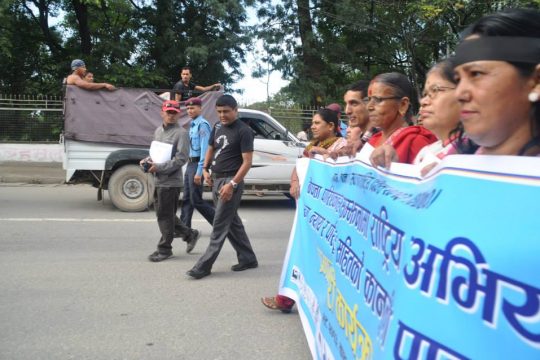On April 13th, 2017 The Supreme Court of Nepal issued an arrest warrant for Balkrishna Dhungel, a Maoist leader and former parliamentarian, who was convicted of a murder that took place during the Nepal’s Armed Conflict. Supreme Court Justice Anand Mohan Bhattarai said “If the government agencies keep silent when the judiciary receive threats and intimidation from convicted perpetrators, the judges and the court will lose the credibility” in the direction to the government.
Seven years ago Dhungel was sentenced to life in prison when he was then a member of first constituent assembly. The government decided to annul the conviction and dismiss the case; Maoist leaders argued such a conviction was against the spirit of the peace process. The key political parties: Nepali Congress, Communist Party of Nepal – United Marxist Leninist and Maoist have been defending the alleged perpetrators of war crimes from both rebellion and security sides for years. The political parties, the judiciary and the executives have been confronting, and debating amnesties while making no effort to strengthen the existing justice system; all sides have forgotten about the human rights system. The parties are against the court verdicts in many cases; Biplav, the General Secretary of the Communist Party of Nepal has charged that “the judiciary is counter-revolutionary” while simultaneously defending Balkrishna Dhungel as ‘republican fighter’ and mobilizing his party cadres for the new unified revolution.
The Attorney General Raman Shrestha recently said “The courts in Nepal are opposing the spirit of Comprehensive Peace Agreement, and creating obstacles in the peace process”. It seems that there is no reconciliation and different understanding between the executive powers and the judiciary, and the comprehensive peace agreement[1] (CPA) and the Court. In the aftermath of conflict the coalition government has withdrawn hundreds of conflict related criminal cases in a ‘political consensus’ and they have not implemented the Rayamajhi Commission’s report (2006) and the National Human Rights Commission’s recommendations[2] to the government against conflict related violations. The Government rejected the UN OHCHR Nepal conflict report (2012)[3], promoting a rule of lawlessness and culture of impunity.
On 16th April, 2017, the District Court of Kavre convicted three out of four Army Officers accused of Maina Sunuwar's Murder. Maina was 15 years old when four Army officers kidnapped, tortured, raped and killed her during the conflict in 2004. The District Court issued the verdict, convicted then Army Officers Babi Khatri, Amit Pun and Sunil Adhikari and sentenced them to 20 years’ imprisonment for murder. The serving Captain (now Major) Niranjan Basnet was acquitted. Basnet still serves in the Nepal Army, likewise hundreds of officials from the security forces deny their alleged crimes, not respecting the civilian court’s verdicts against their members and not supporting the ongoing transitional justice process. Rather they threaten victims, activists and witnesses. This court decision has brought hope for justice for the victims, but its difficult to hold perpetrators accountable in Nepal’s current context where the key political parties and the security forces have a secret deal to forget the past to serve their mutual interest that remains to be seen whether the alleged perpetrators will be punished.
There is a gap between the criminal justice system and transitional justice approaches in Nepal. The government is neither implementing the rule of law nor adopting the transitional justice norms to solve these problems. The political parties and human rights groups continue to debate amnesty versus prosecution, while victims and conflict survivors suffer and their needs are marginalized. The politically controlled transitional justice mechanisms fail to meet the victims’ expectations and there is little hope for meaningful transitional justice reforms. Both commissions are lost in terms of investigating the registered complaints, delivering a strong report and accomplishing their mandate, failed to develop a partnership with victims groups, human rights and civil society organisations. It’s a lost opportunity.
Vanishing hope
The transitional justice mechanisms are passive and off track due to lack of necessary law, resources and expertise; more than that there is no political will and facing internal challenges to serve the political interest instead of developing a fair investigation. The existing transitional justice mechanisms – the Truth and Reconciliation Commission (TRC)[4] and Commission on Investigation of Enforced Disappeared Persons (CIEDP)[5] – are both failing to deal with those cases independently and creating environment for potential reconciliation in the communities. The commissions are about to collapse and there are no such provisions that where those collected more than 60,000 registered complaints and evidences of the conflict related violations will be gone? The authorities should respect a rule of law to gain a civic trust through enforcing court verdicts and create a suitable environment for transitional justice process through effective steps immediately for raising a hope for justice.
The ways forward
What is needed is an independent commission with the necessary legal mandate, adequate resources, expertise and power to investigate and recommend prosecution and reparation to support marginalised victims communities and their livelihood for a sustainable future. Nepal must find a better path to reconcile various actors, all of the actors must contribute to successfully implement the spirit of comprehensive peace agreement to sustain nation’s transformative agenda with a political will to accept changes, National Human Rights Commission’s recommendations and court directives to advance the human rights and rule of law in the country. New challenges now for Nepal transitional justice process is to protect and investigate those registered complaints for the future course of justice. It must separate a function of criminal justice and need of transitional justice, every actor should act as responsible actor to solve the current deadlock and move forward respecting victims right to truth and justice.
[1] http://peacemaker.un.org/sites/peacemaker.un.org/files/NP_061122_Comprehensive%20Peace%20Agreement%20between%20the%20Government%20and%20the%20CPN%20%28Maoist%29.pdf
[2]http://nhrcnepal.org/nhrc_new/doc/newsletter/Nepal_NHRC_CPA_10Yrs_Report_Eng_2016.pdf
[3]http://www.ohchr.org/Documents/Countries/NP/OHCHR_Nepal_Conflict_Report2012.pdf
[4] http://www.trc.gov.np/
[5] http://www.ciedp.gov.np/index.php





